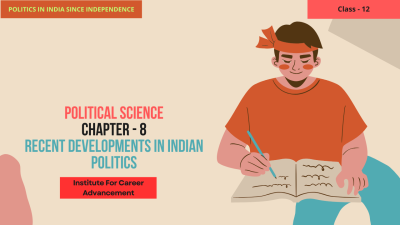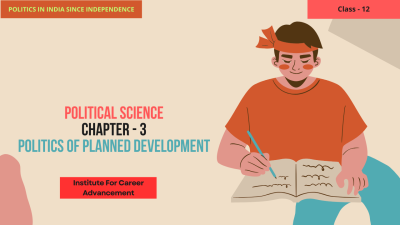Courses


 Compare
Compare
Recent Developments in Indian Politics is a chapter in Class 12 Political Science that focuses on the latest political events and trends in India. It covers a wide range of topics, including: Elections: Recent national and state elections, their outcomes, and their implications for Indian politics. Government Policies: Key policies and initiatives introduced by the government, their impact, and public reactions. Political Parties: The activities, strategies, and alliances of major political parties. Social and Economic Issues: The government's approach to addressing social and economic challenges, such as poverty, inequality, and development. International Relations: India's foreign policy initiatives, its relations with other countries, and its role in global affairs. This chapter aims to provide students with a comprehensive understanding of the current political landscape in India and the factors influencing its development. ভারতীয় রাজনীতিতে সাম্প্রতিক উন্নয়ন হল দ্বাদশ শ্রেণির রাষ্ট্রবিজ্ঞানের একটি অধ্যায় যা ভারতের সর্বশেষ রাজনৈতিক ঘটনা এবং প্রবণতাগুলির উপর দৃষ্টি নিবদ্ধ করে। এটি বিভিন্ন বিষয়কে অন্তর্ভুক্ত করে, যার মধ্যে রয়েছেঃ নির্বাচনঃ সাম্প্রতিক জাতীয় ও রাজ্য নির্বাচন, তাদের ফলাফল এবং ভারতীয় রাজনীতিতে তাদের প্রভাব। সরকারী নীতিঃ সরকার কর্তৃক প্রবর্তিত মূল নীতি ও উদ্যোগ, তাদের প্রভাব এবং জনসাধারণের প্রতিক্রিয়া। রাজনৈতিক দলঃ প্রধান রাজনৈতিক দলগুলির কার্যকলাপ, কৌশল এবং জোট। সামাজিক ও অর্থনৈতিক সমস্যাঃ দারিদ্র্য, অসমতা এবং উন্নয়নের মতো সামাজিক ও অর্থনৈতিক চ্যালেঞ্জ মোকাবেলায় সরকারের দৃষ্টিভঙ্গি। আন্তর্জাতিক সম্পর্কঃ ভারতের বৈদেশিক নীতির উদ্যোগ, অন্যান্য দেশের সাথে এর সম্পর্ক এবং বৈশ্বিক বিষয়ে এর ভূমিকা। এই অধ্যায়ের লক্ষ্য হল শিক্ষার্থীদের ভারতের বর্তমান রাজনৈতিক দৃশ্যপট এবং এর বিকাশকে প্রভাবিত করে এমন কারণগুলি সম্পর্কে একটি বিস্তৃত ধারণা প্রদান করা।
0 Lessons
Hours

 Compare
Compare
Regional Aspirations is a chapter in Class 12 Political Science that explores the diverse regional aspirations and identities within India. It delves into the historical and cultural factors that have shaped regional identities and the demands for greater autonomy or self-governance. The chapter examines the challenges and opportunities arising from regionalism, including issues of resource allocation, language, and cultural preservation. It also discusses the role of federalism in addressing regional aspirations and maintaining national unity. আঞ্চলিক আকাঙ্ক্ষা হল দ্বাদশ শ্রেণির রাষ্ট্রবিজ্ঞানের একটি অধ্যায় যা ভারতের মধ্যে বিভিন্ন আঞ্চলিক আকাঙ্ক্ষা এবং পরিচয়ের অন্বেষণ করে। এটি আঞ্চলিক পরিচয়কে রূপদানকারী ঐতিহাসিক ও সাংস্কৃতিক কারণগুলি এবং বৃহত্তর স্বায়ত্তশাসন বা স্ব-শাসনের দাবির উপর আলোকপাত করে। এই অধ্যায়ে সম্পদ বরাদ্দ, ভাষা এবং সাংস্কৃতিক সংরক্ষণের বিষয়গুলি সহ আঞ্চলিকতা থেকে উদ্ভূত চ্যালেঞ্জ এবং সুযোগগুলি পরীক্ষা করা হয়েছে। এটি আঞ্চলিক আকাঙ্ক্ষা এবং জাতীয় ঐক্য বজায় রাখতে যুক্তরাষ্ট্রীয়তার ভূমিকা নিয়েও আলোচনা করে।
0 Lessons
Hours

 Compare
Compare
The "Crisis of Democratic Order" chapter in Class 12 Political Science explores the events leading up to and during the Emergency declared by Indira Gandhi in 1975. It delves into the tensions between the government and the judiciary, the growing opposition to Indira Gandhi's leadership, and the rationale for imposing emergency measures. The chapter also examines the consequences of the Emergency, including the suspension of civil liberties, press censorship, and the impact on democratic institutions. It provides insights into the challenges and complexities faced by Indian democracy during this critical period. দ্বাদশ শ্রেণির রাষ্ট্রবিজ্ঞানের "গণতান্ত্রিক শৃঙ্খলার সংকট" অধ্যায়টি 1975 সালে ইন্দিরা গান্ধীর ঘোষিত জরুরি অবস্থার আগে এবং তার সময়কার ঘটনাগুলি অন্বেষণ করে। এতে সরকার ও বিচার বিভাগের মধ্যে উত্তেজনা, ইন্দিরা গান্ধীর নেতৃত্বের ক্রমবর্ধমান বিরোধিতা এবং জরুরি ব্যবস্থা আরোপের যৌক্তিকতা তুলে ধরা হয়েছে। এই অধ্যায়ে নাগরিক স্বাধীনতা স্থগিতকরণ, সংবাদপত্রের সেন্সরশিপ এবং গণতান্ত্রিক প্রতিষ্ঠানের উপর প্রভাব সহ জরুরি অবস্থার পরিণতিও পরীক্ষা করা হয়েছে। এটি এই সংকটময় সময়ে ভারতীয় গণতন্ত্রের সম্মুখীন হওয়া চ্যালেঞ্জ এবং জটিলতার অন্তর্দৃষ্টি প্রদান করে।
0 Lessons
Hours

 Compare
Compare
The chapter on Challenges to and Restoration of the Congress System in Class 12 Political Science examines the evolution of the Indian National Congress as a political party from independence through the late 20th century. It focuses on the challenges the Congress faced during various political crises, particularly during the 1960s and 1970s, and how these challenges affected its dominance in Indian politics. Key Themes: Initial Dominance of Congress: After independence, the Congress emerged as the principal political party, successfully leading India through its formative years. Challenges in the 1960s and 1970s: The chapter discusses the internal and external challenges faced by the Congress, including: Growing dissent and fragmentation within the party. Rise of regional parties and increased political competition. Economic crises, including food shortages and inflation, which led to public dissatisfaction. The Emergency (1975-77): A significant focus is on the declaration of Emergency by Prime Minister Indira Gandhi, marking a critical period in Indian politics. The Emergency led to widespread political repression, suspension of civil liberties, and significant opposition to the Congress. Post-Emergency Period: The chapter explores the aftermath of the Emergency, including the 1977 elections and the formation of the Janata Party, which marked the first non-Congress government at the center. Restoration of the Congress System: The return of Indira Gandhi to power in the 1980 elections and the subsequent resurgence of the Congress party is analyzed. The chapter also discusses how the Congress adapted to changing political dynamics and the challenges posed by new social and political movements. Long-term Impact: The chapter concludes by examining the long-term implications of these challenges and restorations on the Congress party and Indian politics as a whole, setting the stage for the party’s strategies in the subsequent decades. দ্বাদশ শ্রেণীতে রাষ্ট্রবিজ্ঞানে কংগ্রেস ব্যবস্থার চ্যালেঞ্জ ও পুনরুদ্ধারের অধ্যায়টি স্বাধীনতা থেকে 20 শতকের শেষের দিকে একটি রাজনৈতিক দল হিসাবে ভারতীয় জাতীয় কংগ্রেসের বিবর্তন পরীক্ষা করে। এটি বিভিন্ন রাজনৈতিক সঙ্কটের সময়, বিশেষত 1960 এবং 1970-এর দশকে কংগ্রেস যে চ্যালেঞ্জগুলির মুখোমুখি হয়েছিল এবং কীভাবে এই চ্যালেঞ্জগুলি ভারতীয় রাজনীতিতে তার আধিপত্যকে প্রভাবিত করেছিল তার উপর দৃষ্টি নিবদ্ধ করে। মূল বিষয়ঃ কংগ্রেসের প্রাথমিক আধিপত্যঃ স্বাধীনতার পর, কংগ্রেস প্রধান রাজনৈতিক দল হিসাবে আবির্ভূত হয়, যা তার গঠনমূলক বছরগুলিতে সফলভাবে ভারতকে নেতৃত্ব দেয়। 1960 ও 1970-এর দশকের চ্যালেঞ্জঃ এই অধ্যায়ে কংগ্রেসের অভ্যন্তরীণ ও বাহ্যিক চ্যালেঞ্জগুলি নিয়ে আলোচনা করা হয়েছে, যার মধ্যে রয়েছেঃ দলের মধ্যে ক্রমবর্ধমান মতবিরোধ এবং বিভাজন। আঞ্চলিক দলগুলির উত্থান এবং রাজনৈতিক প্রতিযোগিতা বৃদ্ধি। খাদ্যের ঘাটতি এবং মুদ্রাস্ফীতি সহ অর্থনৈতিক সংকট, যা জনসাধারণের অসন্তোষের দিকে পরিচালিত করে। জরুরি অবস্থা (1975-77) প্রধানমন্ত্রী ইন্দিরা গান্ধীর জরুরি অবস্থা ঘোষণার উপর একটি উল্লেখযোগ্য দৃষ্টি নিবদ্ধ করা হয়েছে, যা ভারতীয় রাজনীতির একটি গুরুত্বপূর্ণ সময়কে চিহ্নিত করে। জরুরি অবস্থা ব্যাপক রাজনৈতিক দমন, নাগরিক স্বাধীনতা স্থগিত এবং কংগ্রেসের উল্লেখযোগ্য বিরোধিতার দিকে পরিচালিত করে। জরুরি অবস্থা পরবর্তী সময়কালঃ এই অধ্যায়টি 1977 সালের নির্বাচন এবং জনতা পার্টি গঠন সহ জরুরি অবস্থার পরিণতি অনুসন্ধান করে, যা কেন্দ্রে প্রথম অ-কংগ্রেস সরকারকে চিহ্নিত করেছিল। কংগ্রেস ব্যবস্থার পুনরুদ্ধারঃ 1980 সালের নির্বাচনে ইন্দিরা গান্ধীর ক্ষমতায় ফিরে আসা এবং পরবর্তী কংগ্রেস দলের পুনরুত্থান বিশ্লেষণ করা হয়। এই অধ্যায়ে আরও আলোচনা করা হয়েছে যে, কীভাবে কংগ্রেস পরিবর্তিত রাজনৈতিক গতিবিধি এবং নতুন সামাজিক ও রাজনৈতিক আন্দোলনের দ্বারা উদ্ভূত চ্যালেঞ্জগুলির সঙ্গে খাপ খাইয়ে নিয়েছে। দীর্ঘমেয়াদী প্রভাবঃ এই অধ্যায়টি কংগ্রেস দল এবং সামগ্রিকভাবে ভারতীয় রাজনীতিতে এই চ্যালেঞ্জ এবং পুনরুদ্ধারের দীর্ঘমেয়াদী প্রভাবগুলি পরীক্ষা করে শেষ হয়, যা পরবর্তী দশকগুলিতে দলের কৌশলগুলির জন্য মঞ্চ তৈরি করে।
0 Lessons
Hours

 Compare
Compare
India's External Relations is a crucial chapter in Class 12 Political Science, exploring India's interactions with the global community. It delves into the factors that shape India's foreign policy, its relationships with neighboring countries and major powers, and its role in international organizations. Key aspects covered in this chapter include: Geopolitical Factors: Understanding the geographical location, historical context, and security concerns that influence India's foreign policy. Non-Aligned Movement (NAM): Analyzing India's role in NAM and its significance in the Cold War era. India-Pakistan Relations: Examining the complex and often contentious relationship between India and Pakistan, including issues like Kashmir and terrorism. India-China Relations: Discussing the growing importance of India-China relations and the challenges and opportunities presented by their economic and strategic partnership. India's Nuclear Policy: Exploring India's decision to conduct nuclear tests and its subsequent nuclear doctrine. India's Role in International Organizations: Analyzing India's participation in organizations like the United Nations, the Commonwealth, and the G20. By studying this chapter, students gain insights into the complexities of international relations and India's position in the global arena. They also learn about the challenges and opportunities faced by India in its quest to balance its national interests with its global responsibilities. ভারতের বাহ্যিক সম্পর্ক দ্বাদশ শ্রেণির রাষ্ট্রবিজ্ঞানের একটি গুরুত্বপূর্ণ অধ্যায়, যা বিশ্ব সম্প্রদায়ের সাথে ভারতের মিথস্ক্রিয়া অন্বেষণ করে। এটি ভারতের বৈদেশিক নীতি, প্রতিবেশী দেশ ও প্রধান শক্তিগুলির সঙ্গে এর সম্পর্ক এবং আন্তর্জাতিক সংস্থাগুলিতে এর ভূমিকাকে রূপদানকারী কারণগুলি নিয়ে আলোচনা করে। এই অধ্যায়ে অন্তর্ভুক্ত মূল বিষয়গুলি হলঃ ভূ-রাজনৈতিক কারণঃ ভৌগোলিক অবস্থান, ঐতিহাসিক প্রেক্ষাপট এবং নিরাপত্তা সংক্রান্ত উদ্বেগ যা ভারতের বৈদেশিক নীতিকে প্রভাবিত করে তা বোঝা। জোট-নিরপেক্ষ আন্দোলন (ন্যাম) ন্যামে ভারতের ভূমিকা এবং শীতল যুদ্ধের যুগে এর গুরুত্ব বিশ্লেষণ করা। ভারত-পাকিস্তান সম্পর্কঃ কাশ্মীর এবং সন্ত্রাসবাদের মতো বিষয়গুলি সহ ভারত ও পাকিস্তানের মধ্যে জটিল এবং প্রায়শই বিতর্কিত সম্পর্ক পরীক্ষা করা। ভারত-চীন সম্পর্কঃ ভারত-চীন সম্পর্কের ক্রমবর্ধমান গুরুত্ব এবং তাদের অর্থনৈতিক ও কৌশলগত অংশীদারিত্বের দ্বারা উপস্থাপিত চ্যালেঞ্জ ও সুযোগগুলি নিয়ে আলোচনা করা হচ্ছে। ভারতের পারমাণবিক নীতিঃ পারমাণবিক পরীক্ষা পরিচালনার জন্য ভারতের সিদ্ধান্ত এবং তার পরবর্তী পারমাণবিক মতবাদ অন্বেষণ করা। আন্তর্জাতিক সংস্থাগুলিতে ভারতের ভূমিকাঃ জাতিসংঘ, কমনওয়েলথ এবং জি-20-এর মতো সংস্থাগুলিতে ভারতের অংশগ্রহণ বিশ্লেষণ করা। এই অধ্যায়টি অধ্যয়নের মাধ্যমে শিক্ষার্থীরা আন্তর্জাতিক সম্পর্কের জটিলতা এবং বিশ্ব ক্ষেত্রে ভারতের অবস্থান সম্পর্কে অন্তর্দৃষ্টি অর্জন করে। তাঁরা আন্তর্জাতিক দায়িত্বের সঙ্গে জাতীয় স্বার্থের ভারসাম্য বজায় রাখার জন্য ভারতের সম্মুখীন হওয়া চ্যালেঞ্জ ও সুযোগ সম্পর্কেও জানতে পারেন।
0 Lessons
Hours

 Compare
Compare
Politics of Planned Development is a crucial chapter in Class 12 Political Science, exploring India's journey towards economic growth and development post-independence. It delves into the strategies, policies, and political debates that shaped India's development path. Key aspects covered in this chapter include: The Nehruvian Model: Understanding the central role played by Jawaharlal Nehru in shaping India's economic vision. Five-Year Plans: Analyzing the implementation and impact of India's five-year plans, designed to promote industrialization and self-sufficiency. Public Sector Enterprises: Examining the role of state-owned enterprises in India's economic development and their evolution over time. Green Revolution: Discussing the agricultural reforms and technological innovations that led to increased food production. Economic Liberalization: Exploring the shift from a centrally planned economy to a market-oriented one in the 1990s. Challenges and Criticisms: Addressing the limitations, controversies, and inequalities associated with India's development model. By studying this chapter, students gain insights into the complex interplay between politics, economics, and society in shaping a nation's development trajectory. They also learn about the successes, failures, and ongoing challenges faced by India in its quest for progress. পরিকল্পিত উন্নয়নের রাজনীতি দ্বাদশ শ্রেণির রাষ্ট্রবিজ্ঞানের একটি গুরুত্বপূর্ণ অধ্যায়, যা স্বাধীনতা-পরবর্তী অর্থনৈতিক প্রবৃদ্ধি ও উন্নয়নের দিকে ভারতের যাত্রাকে অন্বেষণ করে। এটি ভারতের উন্নয়নের পথকে রূপদানকারী কৌশল, নীতি এবং রাজনৈতিক বিতর্কগুলি নিয়ে আলোচনা করে। এই অধ্যায়ে অন্তর্ভুক্ত মূল বিষয়গুলি হলঃ নেহরুভিয়ান মডেলঃ ভারতের অর্থনৈতিক দৃষ্টিভঙ্গি গঠনে জওহরলাল নেহরুর কেন্দ্রীয় ভূমিকাকে বোঝা। পঞ্চবার্ষিকী পরিকল্পনাঃ শিল্পায়ন ও স্বয়ংসম্পূর্ণতা বৃদ্ধির জন্য পরিকল্পিত ভারতের পঞ্চবার্ষিকী পরিকল্পনার বাস্তবায়ন ও প্রভাব বিশ্লেষণ করা। পাবলিক সেক্টর এন্টারপ্রাইজঃ ভারতের অর্থনৈতিক উন্নয়ন এবং সময়ের সাথে তাদের বিবর্তনে রাষ্ট্রীয় মালিকানাধীন উদ্যোগের ভূমিকা পরীক্ষা করা। সবুজ বিপ্লবঃ কৃষি সংস্কার এবং প্রযুক্তিগত উদ্ভাবন নিয়ে আলোচনা করা যার ফলে খাদ্য উৎপাদন বৃদ্ধি পেয়েছে। অর্থনৈতিক উদারীকরণঃ 1990-এর দশকে কেন্দ্রীয়ভাবে পরিকল্পিত অর্থনীতি থেকে বাজারমুখী অর্থনীতিতে পরিবর্তনের অন্বেষণ। চ্যালেঞ্জ এবং সমালোচনাঃ ভারতের উন্নয়ন মডেলের সঙ্গে যুক্ত সীমাবদ্ধতা, বিতর্ক এবং বৈষম্যের মোকাবিলা করা। এই অধ্যায়টি অধ্যয়নের মাধ্যমে শিক্ষার্থীরা একটি জাতির উন্নয়নের গতিপথ গঠনে রাজনীতি, অর্থনীতি এবং সমাজের মধ্যে জটিল আন্তঃক্রিয়া সম্পর্কে অন্তর্দৃষ্টি অর্জন করে। তারা সাফল্য, ব্যর্থতা এবং অগ্রগতির সন্ধানে ভারতের চলমান চ্যালেঞ্জগুলি সম্পর্কেও জানতে পারে।
0 Lessons
Hours

 Compare
Compare
The era of one-party dominance refers to a period in a country's history where a single political party maintains a prolonged and dominant position in government. This chapter explores the characteristics, implications, and challenges associated with one-party dominance. Key points covered: Characteristics of One-Party Dominance: Examines the factors that contribute to the establishment and maintenance of one-party dominance, such as strong leadership, effective party organization, and limited political competition. Implications of One-Party Dominance: Discusses the potential benefits and drawbacks of one-party dominance, including political stability, economic development, and the potential for authoritarianism. Challenges of One-Party Dominance: Explores the challenges faced by one-party systems, such as lack of accountability, corruption, and resistance from opposition forces. Case Studies: Analyzes specific examples of one-party dominance in different countries, highlighting the unique characteristics and outcomes of each case. Transition to Democracy: Examines the process of transitioning from one-party dominance to democracy, including the challenges and strategies involved. By understanding the era of one-party dominance, students can develop a critical perspective on the relationship between political systems and democratic governance. একদলীয় আধিপত্যের যুগ বলতে একটি দেশের ইতিহাসে এমন একটি সময়কে বোঝায় যখন একটি একক রাজনৈতিক দল সরকারে দীর্ঘ এবং প্রভাবশালী অবস্থান বজায় রাখে। এই অধ্যায়টি একদলীয় আধিপত্যের সাথে সম্পর্কিত বৈশিষ্ট্য, প্রভাব এবং চ্যালেঞ্জগুলি অন্বেষণ করে। অন্তর্ভুক্ত মূল বিষয়গুলিঃ এক-দলীয় আধিপত্যের বৈশিষ্ট্যঃ শক্তিশালী নেতৃত্ব, কার্যকর দলীয় সংগঠন এবং সীমিত রাজনৈতিক প্রতিযোগিতার মতো এক-দলীয় আধিপত্য প্রতিষ্ঠা ও রক্ষণাবেক্ষণে অবদান রাখার কারণগুলি পরীক্ষা করে। এক-দলীয় আধিপত্যের প্রভাবঃ রাজনৈতিক স্থিতিশীলতা, অর্থনৈতিক উন্নয়ন এবং কর্তৃত্ববাদের সম্ভাবনা সহ এক-দলীয় আধিপত্যের সম্ভাব্য সুবিধা এবং অসুবিধাগুলি নিয়ে আলোচনা করে। এক-দলীয় আধিপত্যের চ্যালেঞ্জঃ জবাবদিহিতার অভাব, দুর্নীতি এবং বিরোধী শক্তির প্রতিরোধের মতো এক-দলীয় ব্যবস্থার চ্যালেঞ্জগুলি অন্বেষণ করে। কেস স্টাডিঃ প্রতিটি মামলার অনন্য বৈশিষ্ট্য এবং ফলাফল তুলে ধরে বিভিন্ন দেশে এক পক্ষের আধিপত্যের নির্দিষ্ট উদাহরণ বিশ্লেষণ করে। গণতন্ত্রে রূপান্তরঃ এক-দলীয় আধিপত্য থেকে গণতন্ত্রে রূপান্তরের প্রক্রিয়া, এর সাথে জড়িত চ্যালেঞ্জ এবং কৌশলগুলি পরীক্ষা করে। একদলীয় আধিপত্যের যুগকে বোঝার মাধ্যমে শিক্ষার্থীরা রাজনৈতিক ব্যবস্থা এবং গণতান্ত্রিক শাসনের মধ্যে সম্পর্কের বিষয়ে একটি সমালোচনামূলক দৃষ্টিভঙ্গি গড়ে তুলতে পারে।
0 Lessons
Hours

 Compare
Compare
Nation-building, the process of creating a unified national identity and state, is often fraught with challenges. This chapter explores the various obstacles that nations face in their quest for unity and development. Key points covered: Historical Legacy: Examines the impact of historical factors, such as colonialism, conflict, and division, on nation-building efforts. Cultural Diversity: Discusses the challenges posed by cultural diversity, including language barriers, religious differences, and ethnic tensions. Political Instability: Explores the destabilizing effects of political instability, including coups, civil wars, and corruption. Economic Development: Examines the challenges of economic development, such as poverty, inequality, and lack of infrastructure. Social Issues: Discusses social issues that can hinder nation-building, such as gender inequality, discrimination, and lack of education. By understanding the challenges of nation-building, students can develop a critical perspective on the complexities of nation-states and the factors that contribute to their success or failure. জাতি গঠন, একটি ঐক্যবদ্ধ জাতীয় পরিচয় ও রাষ্ট্র গঠনের প্রক্রিয়া প্রায়শই চ্যালেঞ্জের সম্মুখীন হয়। এই অধ্যায়টি ঐক্য ও উন্নয়নের সন্ধানে জাতিগুলি যে বিভিন্ন বাধার সম্মুখীন হয় তা অন্বেষণ করে। অন্তর্ভুক্ত মূল বিষয়গুলিঃ ঐতিহাসিক উত্তরাধিকারঃ জাতি গঠনের প্রচেষ্টায় উপনিবেশবাদ, দ্বন্দ্ব এবং বিভাজনের মতো ঐতিহাসিক কারণগুলির প্রভাব পরীক্ষা করে। সাংস্কৃতিক বৈচিত্র্যঃ ভাষাগত বাধা, ধর্মীয় পার্থক্য এবং জাতিগত উত্তেজনা সহ সাংস্কৃতিক বৈচিত্র্যের দ্বারা উদ্ভূত চ্যালেঞ্জগুলি নিয়ে আলোচনা করে। রাজনৈতিক অস্থিতিশীলতাঃ অভ্যুত্থান, গৃহযুদ্ধ এবং দুর্নীতি সহ রাজনৈতিক অস্থিতিশীলতার অস্থিতিশীল প্রভাবগুলি অন্বেষণ করে। অর্থনৈতিক উন্নয়নঃ দারিদ্র্য, অসমতা এবং পরিকাঠামোর অভাবের মতো অর্থনৈতিক উন্নয়নের চ্যালেঞ্জগুলি পরীক্ষা করে। সামাজিক বিষয়ঃ লিঙ্গ বৈষম্য, বৈষম্য এবং শিক্ষার অভাবের মতো সামাজিক বিষয়গুলি নিয়ে আলোচনা করা হয় যা জাতি গঠনে বাধা সৃষ্টি করতে পারে। জাতি গঠনের চ্যালেঞ্জগুলি বোঝার মাধ্যমে, শিক্ষার্থীরা জাতি-রাষ্ট্রের জটিলতা এবং তাদের সাফল্য বা ব্যর্থতার কারণগুলি সম্পর্কে একটি সমালোচনামূলক দৃষ্টিভঙ্গি গড়ে তুলতে পারে।
0 Lessons
Hours

 Compare
Compare
Globalization refers to the increasing interconnectedness of the world's economies, cultures, and societies. This chapter explores the various aspects of globalization, including its drivers, benefits, challenges, and implications for different countries and regions. Key points covered: Drivers of Globalization: Examines the factors that have contributed to the globalization process, such as technological advancements, economic liberalization, and political changes. Benefits of Globalization: Discusses the potential benefits of globalization, including economic growth, increased trade, cultural exchange, and technological advancements. Challenges of Globalization: Explores the challenges associated with globalization, such as inequality, job losses, cultural homogenization, and environmental degradation. Globalization and Developing Countries: Examines the impact of globalization on developing countries, including both opportunities and challenges. Global Governance: Discusses the need for global governance to address the challenges and opportunities presented by globalization. By understanding the complexities of globalization, students can develop a critical perspective on the interconnectedness of the world and the implications of global trends for individuals, societies, and nations. বিশ্বায়ন বলতে বিশ্বের অর্থনীতি, সংস্কৃতি এবং সমাজের ক্রমবর্ধমান আন্তঃসংযোগকে বোঝায়। এই অধ্যায়টি বিশ্বায়নের বিভিন্ন দিক অন্বেষণ করে, যার মধ্যে রয়েছে এর চালিকাশক্তি, সুবিধা, চ্যালেঞ্জ এবং বিভিন্ন দেশ ও অঞ্চলের জন্য প্রভাব। অন্তর্ভুক্ত মূল বিষয়গুলিঃ বিশ্বায়নের চালিকাশক্তিঃ প্রযুক্তিগত অগ্রগতি, অর্থনৈতিক উদারীকরণ এবং রাজনৈতিক পরিবর্তনের মতো বিশ্বায়ন প্রক্রিয়ায় অবদান রাখার কারণগুলি পরীক্ষা করে। বিশ্বায়নের উপকারিতাঃ অর্থনৈতিক প্রবৃদ্ধি, বাণিজ্য বৃদ্ধি, সাংস্কৃতিক বিনিময় এবং প্রযুক্তিগত অগ্রগতি সহ বিশ্বায়নের সম্ভাব্য সুবিধাগুলি নিয়ে আলোচনা করা হয়েছে। বিশ্বায়নের চ্যালেঞ্জঃ অসমতা, চাকরি হারানো, সাংস্কৃতিক সমজাতীয়করণ এবং পরিবেশগত অবক্ষয়ের মতো বিশ্বায়নের সাথে সম্পর্কিত চ্যালেঞ্জগুলি অন্বেষণ করে। বিশ্বায়ন এবং উন্নয়নশীল দেশঃ সুযোগ এবং চ্যালেঞ্জ উভয় সহ উন্নয়নশীল দেশগুলিতে বিশ্বায়নের প্রভাব পরীক্ষা করে। গ্লোবাল গভর্নেন্সঃ বিশ্বায়নের দ্বারা উপস্থাপিত চ্যালেঞ্জ এবং সুযোগগুলি মোকাবেলায় গ্লোবাল গভর্নেন্সের প্রয়োজনীয়তা নিয়ে আলোচনা করে। বিশ্বায়নের জটিলতাগুলি বোঝার মাধ্যমে, শিক্ষার্থীরা বিশ্বের আন্তঃসংযোগ এবং ব্যক্তি, সমাজ এবং জাতির জন্য বৈশ্বিক প্রবণতার প্রভাব সম্পর্কে একটি সমালোচনামূলক দৃষ্টিভঙ্গি বিকাশ করতে পারে।
0 Lessons
Hours